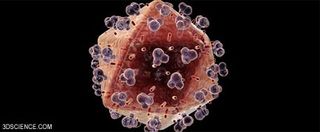Virus

A virus is defined as any of a various number of submicroscopic parasites that can infect any animal, plant or bacteria and often lead to very serious or even deadly diseases. A virus consists of a core of RNA or DNA, generally surrounded by a protein, lipid or glycoprotein coat, or some combination of the three. No virus can replicate without the help of a host cell, and though they can be spread, viruses lack the ability of self-reproduction and are not always considered to be living organisms in the regular sense.Some of the most common or best known viruses include the human immunodeficiency virus (HIV), which is the virus that causes AIDS, the herpes simplex virus, which causes cold sores, smallpox, multiple sclerosis, and the human papilloma virus, now believed to be a leading cause of cervical cancer in adult women. The common human cold is also caused by a virus.Since a great deal of mystery still surrounds the origins of most modern viruses, ways to cure these viruses and the diseases they cause are still in the very early stages of development.
Explore Viruses, Infections & Disease
Latest about Viruses, Infections & Disease

Measles deaths jumped over 40% from 2021 to 2022, CDC reports
By Nicoletta Lanese published
Declines in measles vaccination during the COVID-19 pandemic have been tied to an uptick in measles cases, deaths and major outbreaks worldwide.

Nearly 450 hospital patients in Massachusetts could have been exposed to hepatitis and HIV
By Nicoletta Lanese published
Hundreds of endoscopy patients at a Massachusetts hospital were potentially exposed to blood-borne pathogens, the health care facility reported.

2 Salmonella outbreaks linked to pet foods hit US and Canada
By Nicoletta Lanese published
U.S. and Canadian health officials are separately investigating Salmonella outbreaks, both related to pet foods, in their countries.

'Bionic breast' could restore sensation for cancer survivors
By Emily Cooke published
Scientists are developing a new device that could help breast cancer patients who experience a loss of sensation after having a mastectomy.

NJ officials investigate unusual spike in Legionnaires' disease
By Nicoletta Lanese published
New Jersey health officials are looking for a potential source of the unusual surge in Legionnaires' disease seen in two counties.

Healthy tissue may predict lung cancer return better than tumors
By Emily Cooke published
A new study suggests that the gene activity in healthy tissue surrounding tumors could better predict whether a patient's lung cancer might return after surgery.

In world 1st, virus spotted attached to 2nd virus
By Emily Cooke published
The interaction was captured using a specialized piece of kit called a transmission electron microscope.

Millions more people need lung cancer screening, ACS says
By Nicoletta Lanese published
New guidelines from the American Cancer Society suggest millions more people should get yearly lung cancer screenings than were previously recommended to.
Live Science newsletter
Stay up to date on the latest science news by signing up for our Essentials newsletter.
